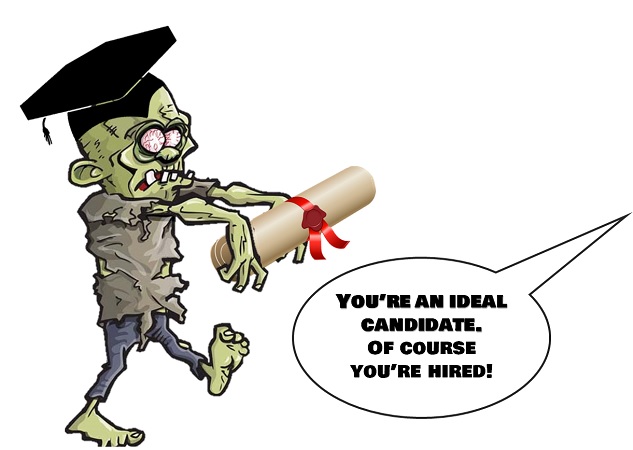A college degree is highly overrated today. Students are graduating without any sense of responsibility or proportion about the realities of life, especially business life. One may even question their intelligence. A while back a college student by the name of Jeff reached out to tell me how he was starting a business while chillin’ with his buds. He said:
I’m a junior in college right now, and during the summer I look for work to help pay for some of my bills and chill with friends. I’ve been doing this for the last 2 years. But, you know, it’s harder to find good summer jobs and usually the pay sucks.
Since I only make money in the summer, I’m strapped for cash during the year. All the while my student loans keeps getting bigger and bigger. I’m dreading the thought of getting out of college with all this debt.
There’s so little work out there. I want to try to reduce my debt over the next couple years before it hits me in the face when I graduate. I know to make this happen I have to make more money, and I can only do this if I work throughout the year not just by getting a summer job.
Getting a job while I’m in college just seems too hard for the low pay that I’ll probably get. So I’m thinking that starting a business when in college might be better money than a normal job. My concern is that I don’t know if I can run a business when I’m in college. With all my studies I may not be able to handle the details of a business. But I really want to get something started soon.
Do you have any advice for a college student like me? What do you think is the best way to run at least a part-time business and go to college at the same time?
In a case like this, no one advice fits all cases. But here’s what I told Jeff about the need for ingenuity to serve a fellowman and the way his own mind had been shaped to see the world around him. Clear these obstacles out of the way and we might have something to work with here.
The Business of Business Is To Serve Others, Not To Follow Orders You Don’t Want To Obey Anyway
Jeff, I said, in the “Life of Horace Mann” written in 1891 by his wife, she writes of his voyage in 1843 to Europe to visit European schools, especially in Germany, where he expected to benefit the most from learning the Prussian methods of instruction.
In Berlin he noted that almost all the public schools there were closed for the summer vacation in June.
By contrast, in New England as early as the 1830s children took time off from schools from April to mid-May to cultivate and from September to November to harvest with their families. They went to school during the summer and winter months. In other words, they worked year round.
But clearly this was not the practice in Germany, and Germany seemed to Horace Mann to be the most civilized nation on earth at that time. America back then was not much unlike an emerging economy today, though incredibly literate, far, FAR beyond what we are today.
Yet it was Prussian discipline and Prussian results that were the rage. Horace Mann ranked Prussia first above all nations in schooling. He recommended and fomented radical changes in the early forms of American schooling – he planted the roots of the education tree that we have today, of which you’re its fruit.
His recommendations spread like wild fire across the land in the 19th-Century.
Read the following carefully from three-times Teacher of the Year John Taylor Gatto. Afterward, get the point of what I’m trying to impress on you by reading further below.
Throughout nineteenth-century Prussia, its new form of education seemed to make that warlike nation prosper materially and militarily.
While German science, philosophy, and military success seduced the whole world, thousands of prominent young Americans made the pilgrimage to Germany to study in its network of research universities, places where teaching and learning were always subordinate to investigations done on behalf of business and the state.
Returning home with the coveted German Ph.D., those so degreed became university presidents and department heads, took over private industrial research bureaus, government offices, and the administrative professions. The men they subsequently hired for responsibility were those who found it morally agreeable to offer obeisance to the Prussian outlook, too; in this leveraged fashion the gradual takeover of American mental life managed itself.
For a century here, Germany seemed at the center of everything civilized; nothing was so esoteric or commonplace it couldn’t benefit from the application of German scientific procedure. Hegel, of Berlin University, even proposed historicism—that history was a scientific subject, displaying a progressive linear movement toward some mysterious end.
Elsewhere, Herbart and Fechner were applying mathematical principles to learning, Müller and Helmholtz were grafting physiology to behavior in anticipation of the psychologized classroom, Fritsch and Hitzig were applying electrical stimulation to the brain to determine the relationship of brain functions to behavior, and Germany itself was approaching its epiphany of unification under Bismarck.
When the spirit of Prussian pelotonfeuer crushed France in the lightning war of 1871, the world’s attention focused intently on this hypnotic, utopian place. What could be seen to happen there was an impressive demonstration that endless production flowed from a Baconian liaison between government, the academic mind, and industry.
Credit for Prussian success was widely attributed to its form of schooling. What lay far from casual view was the religious vision of a completely systematic universe which animated this Frankensteinian nation.
Then came World War I, when this Frankenstein revealed the monstrosity that it had become at producing brainwashed minions, not stopping until the end of World War II, when it was vanquished by its more powerful pupil that, no longer being a developing nation, had emerged as conqueror with a more refined New World schooling system that produced a far more programmed and self-righteous generation.
Successful Business Frees The Mind to Do Good Not Just Jobs
Jeff, every problem contains the seed of its own destruction. And the problem of education as we’ve come to know the term today is the way that bureaucrats have taught your generation and previous ones to view the world.
So, first off, you need to detox. Summers are not for chillin’.
Second, you’re already a prisoner of your own debt. Fear of confronting your jailer by prolonging the inevitable wouldn’t help you, were you to wish to stay in college longer.
So, come out as soon as possible and face up to what you owe. Seek a mentor to guide you and pay your debts.
Lastly, there is no such thing as little work “out there”, Jeff. There are jobs you may not like doing for the pay offered. But there’s lots of work to do.
The difference between a job and work is HUGE. Focus on the work to be done, not the job built around work to get the work done through.
You can make work for yourself by being observant enough to exploit the opportunities around you at getting someone from Point A to Point B with greater ease to that person, thereby side-stepping having to compete for the few jobs available to do some pre-defined work available. But you begin by going through a mental detoxing from all those years of Frankensteinian schooling that you’ve been receiving.
Don’t get a job while you’re in college. Instead, work to give someone a job to do while you’re in college. Do that by observing where there is necessary work big enough for two to complete that another does not care to do but someone has the money and is desperate to see it done. Look at work as a duty to fulfill. And step out to confront your duty.
Work Is Endless. Good! Jobs Come And Go. Too Bad!
Do not adopt the mindset of getting a job. Rather, work at creating jobs to hand out to others. Else, you’ll never run a business while in or even after you leave college, because no job-hunting, wage slave ever behaves like a freedman. And that’s the difference between someone who just wants a job vs. someone who wants to work his own business.
The freedman takes on risk and responsibility fully on. The wage slave wants someone else to bear most if not all of the risk and responsibility for finding the work to be done.
My best advice to you, therefore, is not to think of business as a part-time gig that can help you pay some bills and chill out with friends this summer. My best advice to you is to wake up and smell the coffee. It’s time to go do some real work!











